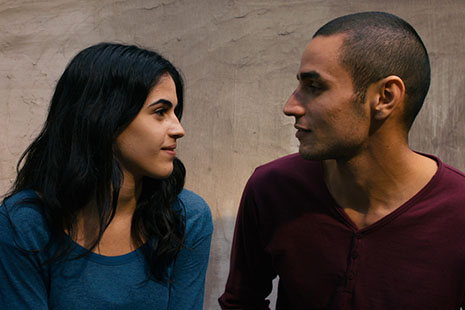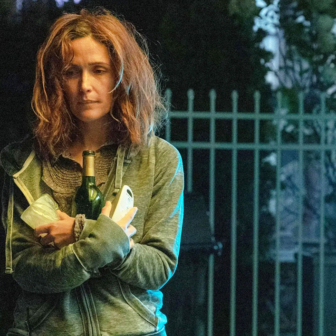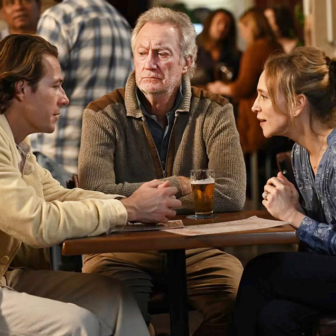The time, the place, the headlines: we look at films in the moments of their arrival, and as the headlines change so does the way we make sense of what we’ve been looking at. In the backwash of the Sydney Film Festival, one of the films left standing solidly in memory is the Palestinian feature, Hany Abu-Assad’s Omar; it has since had a commercial run in Melbourne, and will reappear in other cities. In the month between festival viewings and in the real world, the story thickens. Over there four young men, younger even than the ones we see in the film, are murdered – three Israeli, one Palestinian. An Israeli mother expresses compassion for her Palestinian counterpart; but from the Israeli government there’s no compassion for Gaza, and you could argue that Hamas’ rocket-men, however understandable, are unstrategic. Children, unknown numbers of them, are blown to bits.
In Hany Abu-Assad’s earlier feature, Paradise Now (2006), two young men are trained and committed to duty as suicide bombers. A girl, a childhood friend of both, seeks to persuade them out of it, not only for their own sakes but also from her conviction of the futility of the action. On their presumed last day of life, their paths separate; in the outcome, they make different choices. This film was much praised as a fine Middle Eastern thriller; it’s that, and more than that. In the film festival notes, Omar was also tagged “a high-impact thriller,” and true enough; but in the framework of the present, it becomes an enquiry into high-level political insanity, and like Paradise Now, a rigorous essay on the ethics and tactics of rebellion. Omar (Adam Bakri) is a young pastry cook; the separation wall cuts implacably through his Palestinian community, so that his comrades and his beloved Nadja, still a schoolgirl, live on the other side. Omar is pretty fit; regularly, he tosses up a knotted rope and scales the wall, dodging bullets as he goes. He finds Tarek and Amjad (Iyad Hoorani, Samer Bisharat) and waits for the beautiful Nadja (Leem Lubany) outside the school.
One day, walking the road by the wall, Omar is harassed by the Israeli security police, in a sequence that communicates petty humiliation more acutely than anything I know since certain passages by Ingmar Bergman. The ground of the story is there, in a world of everyday, relentless harassment and obstruction. The three become snipers; Amjad fires off a shot that kills an Israeli soldier, seen falling in the middle distance; then it’s Omar who is arrested. Through the rest of the film, he is jailed, tortured, interrogated, jailed and tortured again. His interrogator, Agent Rami (brilliantly played by Waleed Zuaiter, one of the film’s producers), gives him one chance to deliver Tarek; he is drawn into playing a double game, appearing to give the Israelis what they want while also keeping some kind of faith with his friends and with Nadja. It doesn’t work; they, and she, come to believe that Omar has betrayed them and the Palestinian cause. After the delicacy of the love sequence between them, her loss of faith is something we can measure only at the end, when she herself, facing the camera head-on, makes it clear.
Fast pursuits in the West Bank’s laneways build up, become a complex figure for the impossibility of Omar’s situation and the whole community’s. Omar and his friends are blundering and young; they can’t begin to find adequate strategies, and what we are shown is that under military domination personal integrity cracks and erodes. The struggle between occupation and resistance is radically unequal, but the exchanges between Omar and Rami have an intense dynamic; these enemies are equals. In another world, they could be friends and brothers.
Outside the cinema, in the world of the headlines, the rocketry does little more than express rebellion, and supply the Israeli defence forces with triggering excuses. The bombs on Gaza have, up to this time of writing, destroyed 869 houses and killed 213 people; one Israeli has been killed. Omar is fiction only because it’s true, and the truth compels this story into existence.
On King Street, Newtown, four people are staffing a table with a petition to be signed against the bombing. One passing citizen calls out to the workers that he’ll sign when they organise another petition, one against Hamas. As ever, the warfare in that Mediterranean corner of the world resounds in our cities, shouts from local headlines and rightly so; it’s our business too.
Calvary, written and directed by John Michael McDonagh, is also an investigation, and a complicated case; the viewer’s understanding will have to do with her position in the audience. Believers may adopt Brendan Gleeson’s magisterial Father James as a Christ figure, one prepared to die for the sinners of his world. Others will find themselves watching the workings of faith from somewhere outside them, held by the great intelligence, subtlety and solidity of Gleeson’s performance. He communicates a weather-beaten man who entered the priesthood late, after his wife’s death; he has been a husband, and remains a father, though in that role he has been somewhat less than devoted. Late in the film, his daughter Fiona (Kelly Reilly) tells him that when he made his transition she had felt abandoned – “you were missing in action”; she had lost both parents. This compels us to consider the meaning of such a choice; looking at Father James’s bleak, monastic little room, seeing him at prayer, the only certain thing is his desire for certainty.
He’s under sentence; the days are measured out. For that reason, with all the film’s beauty and energy, some have dismissed it as being schematic, too much fixed to a plot device. But story and vision flow above the structure. Father James’s parish is a village near Sligo in the northwest of Ireland; Larry Smith’s cinematography gives us the wind and blowing light, sun and shadow crossing the talk, surf flowing in on a long beach. (It looks a lot too cold for swimming, though they do.) On the beach a child of nine or ten, first seen as an altar boy, is drawing at an easel. He’s there, at the beginning and end of the film, to typify the church’s many child victims, who are unseen but present. The priest deals with his community of strugglers; there are infidelities, bank foreclosures, drugs, and inexplicable, vengeful violence. There is a young murderer to be visited in jail; there’s the decrepit American novelist still intent on his masterpiece; there’s black comedy in the life of the pub, all of it underlain by Patrick Cassidy’s music score, popular songs and persisting Irish lament.
Some commentary has called up Robert Bresson’s exquisite classic Diary of a Country Priest (1951), and McDonagh himself has cited Bresson as an influence. His ascetic spirit is there in Pawel Pawlikowski’s Ida, discussed here some weeks ago; like that work, Bresson’s films are subtle, contemplative documents, made of muted screen behaviour by mostly unknown, quite un-starry performers, and questions of earthly happiness are very seldom at stake. But if Bresson offered a point of departure for McDonagh, he moved a long way from it; Calvary is a very different kind of cinema, dependent on high-level acting and drama, and obeisance before the crucifixion can never be the end of it.
Above the beach, Father James talks with the sad, childish rich man of the parish, and promises him further solace. Time is ticking away, and (on a first viewing) we’re gripped by suspense; perhaps the priest won’t be able to keep that promise. Coming towards high noon, he reflects that too much is talked of sin, too little of virtue, and that what’s underrated is forgiveness. The film’s final moment endorses him on that.
A fellow cinephile, who saw Calvary first at the film festival, reports that she needed the full ensuing month to work up to a second viewing, at the local Dendy. I can confirm the film’s total impact, and confirm too that the second time is worth it. •





